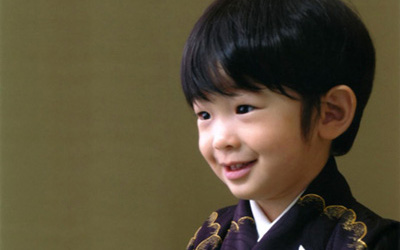AKIPRESS.COM -  When Prince Hisahito was born in 2006, ending a 41-year drought in imperial male heirs, Japan's government gladly dropped proposals that women might head the world's oldest monarchy, but a decade later the little prince remains the last hope for an unreformed Chrysanthemum Throne.
When Prince Hisahito was born in 2006, ending a 41-year drought in imperial male heirs, Japan's government gladly dropped proposals that women might head the world's oldest monarchy, but a decade later the little prince remains the last hope for an unreformed Chrysanthemum Throne.
The issue is back in focus after Emperor Akihito, 82, hinted two months ago at abdication, with only five heirs in the line of succession, including Hisahito, his sole grandson, Reuters said.
The four older heirs are Akihito's centenarian uncle, an 80-year-old brother, and two middle-aged sons whose wives are in their early 50s.
In a rare televised address, Akihito said in August he worried age might make it hard to fulfill his duties. The remarks were interpreted as a desire to abdicate, a step unprecedented in modern Japan and not possible under current law.
The succession quandary has long weighed on Akihito's mind, Japanese media and royal watchers say.
"As the head of the imperial family, the emperor has a great sense of crisis that the royals will disappear," said a veteran Japanese journalist and long-time royal watcher, who declined to be identified because of the sensitivity of the issue.
In a country where the population is rapidly aging and projected to shrink about 30 percent by 2060, the dwindling royal family exemplifies a much larger trend that is also hitting succession planning at Japanese family firms.
Next week a panel appointed by Prime Minister Shinzo Abe will start considering the topic of abdication. Domestic media and academics say the government appears to be leaning towards one-off legislation that would let Akihito step down in favor of eldest son Crown Prince Naruhito, Hisahito's uncle.
Hidehiko Kasahara, an expert in imperial law at Keio University, does not expect Abe's panel to broach the topic of male-only succession, which conservatives see as central to an imperial tradition stretching back 2,600 years.
"The government's stance is to avoid tackling issues like female succession that divide the public," he said.
Though surveys have shown a majority of Japanese favor letting women take the throne and pass it on to their children, conservatives are key to Abe's political support.
Historically, Japan's imperial line was preserved by a combination of concubines and cadet royal families called "miyake", who could supply a male heir in a pinch.
Very occasionally, female place-holders might rule until a male heir was found, but such empresses were either widows or unmarried and did not pass the throne to any children.
But times have changed; Emperor Meiji, who died in 1912, was the last to have concubines, and cadet families were stripped of royal status by the Allied Occupation after Japan's World War Two defeat.
A 1947 law limits succession to male descendants of an emperor.
